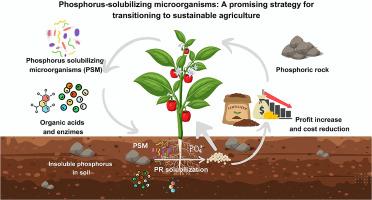Phosphorus dynamics and sustainable agriculture: The role of microbial solubilization and innovations in nutrient management
IF 4.8
Q1 MICROBIOLOGY
引用次数: 0
Abstract
Phosphorus (P) is an essential element for plant growth, playing a crucial role in various metabolic processes. Despite its importance, phosphorus availability in soils is often restricted due to its tendency to form insoluble complexes, limiting plant uptake. The increasing demand for phosphorus in agriculture, combined with limited global reserves of phosphate rock, has created challenges for sustainable plant production. Additionally, the overuse of chemical phosphorus fertilizers has resulted in environmental degradation, such as eutrophication of water bodies. Increasing agronomic phosphorus (P) efficiency is crucial because of population growth and increased food demand. Hence, microorganisms involved in the P cycle are a promising biotechnological strategy that has gained global interest in recent decades. Microorganisms' solubilization of phosphate rock (PR) is an environmentally sustainable alternative to chemical processing for producing phosphate fertilizers. Phosphorus-solubilizing microorganisms (PSMs), including bacteria and fungi, and their enzymatic processes offer an eco-friendly and sustainable alternative to chemical inputs by converting insoluble phosphorus into forms readily available for plant uptake. Integrating PSMs into agricultural systems presents a promising strategy to reduce dependence on chemical fertilizers, enhance soil health, and contribute to the transition toward more sustainable and resilient agricultural practices. It can be an alternative that reduces the loss of phosphorus in the environment, especially the eutrophication of aquatic systems. This paper explores the challenges of phosphorus availability in agriculture and the potential of microbial phosphorus solubilization as a sustainable alternative to conventional practices.

磷动态与可持续农业:微生物增溶作用和养分管理创新
磷(P)是植物生长必需的元素,在各种代谢过程中起着至关重要的作用。尽管磷很重要,但土壤中磷的有效性往往受到限制,因为它倾向于形成不溶性复合体,限制了植物的吸收。农业对磷的需求不断增加,加上全球磷矿储量有限,给可持续植物生产带来了挑战。此外,化学磷肥的过度使用导致水体富营养化等环境退化。由于人口增长和粮食需求增加,提高农用磷(P)效率至关重要。因此,参与磷循环的微生物是一种有前途的生物技术策略,近几十年来已引起全球的兴趣。微生物增溶磷矿(PR)是一种环境可持续的替代化学处理生产磷肥的方法。溶磷微生物(psm),包括细菌和真菌,及其酶促过程通过将不溶性磷转化为易于植物吸收的形式,为化学投入提供了一种生态友好和可持续的替代方案。将psm纳入农业系统是一种很有前景的战略,可以减少对化肥的依赖,增强土壤健康,并有助于向更可持续和更有弹性的农业做法过渡。它可以作为一种替代方案,减少环境中磷的损失,特别是水生系统的富营养化。本文探讨了农业中磷可用性的挑战和微生物磷增溶作为传统做法的可持续替代方案的潜力。
本文章由计算机程序翻译,如有差异,请以英文原文为准。
求助全文
约1分钟内获得全文
求助全文
来源期刊

Current Research in Microbial Sciences
Immunology and Microbiology-Immunology and Microbiology (miscellaneous)
CiteScore
7.90
自引率
0.00%
发文量
81
审稿时长
66 days
 求助内容:
求助内容: 应助结果提醒方式:
应助结果提醒方式:


